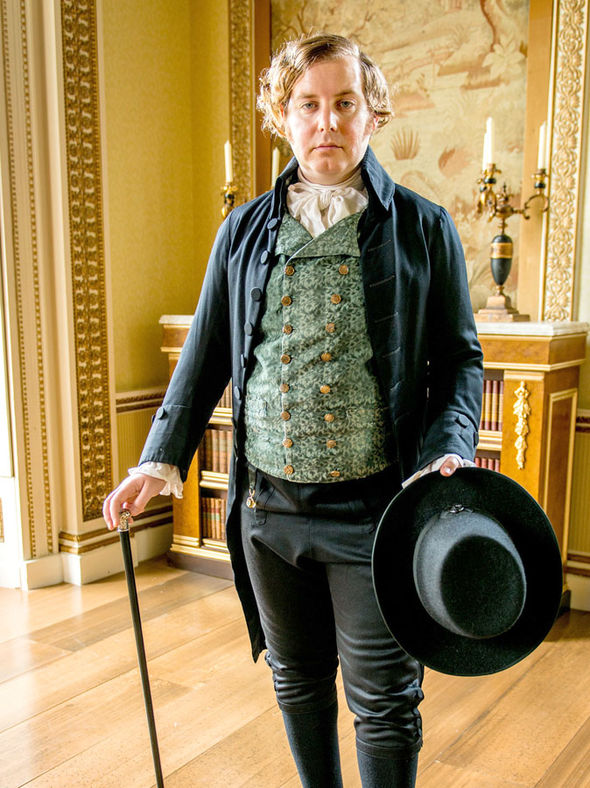A couple of weeks ago, I blew through all three seasons of Poldark in one weekend, or maybe close to it. I had it on in the background as "period piece background noise I didn't expect to really capture my attention," but it totally did. (Apparently I also weirdly forgot my fetish for 18th century men's fashion.)
Not only is the show filled with lush scenery (waves crashing on rocks beneath dramatic cliffs, people riding horses in haste, etc.), but the writing is really, really good. Particularly in Season Two, with the infidelity plotline, every single character involved responds in a way consistent with their character, and in ways that highlight both their positive and negative traits.) (Well, I'm not sure Elizabeth has any positive traits, but whatever).
Season 3 had me pondering the fact that the writer's haven't entirely taken advantage of villain George Warleggan. The WETA blog says he is a flatly evil character, one step away from twirling a mustache; I don't entirely agree, but they do have something of a point. Over the course of the series, George shown himself to be cold and conniving when it comes to both business and life--sometimes playing unfairly. He is weirdly obsessed with taking Ross Poldark down--and what is this based on other than the fact that he basically hates Ross for having what he doesn't: the support of the townspeople, actual love from his wife Elizabeth, a sense of honor. Ostensibly, he has beef with Ross because Ross is "responsible" for inciting the riot that led to the shipwreck being looted (the shipwreck containing some of George's property). But we all know that he 2% cared about the property and 98% just wanted Ross to be tried and hanged--which seems a bit extreme.
But I just rewatched Seasons 1 and 2 and took a closer look at him. The development of his relationship with Elizabeth is a weird mixture of creepy and pitiable. It's clear he likes her when she's married to Francis Poldark and is already attempting to put the moves on her. When he first propositions Elizabeth, more or less, unless I'm wrong, she didn't seem repulsed but genuinely caught off guard. Surprised, but not "oh God how do I get out of this." I think for her it came out of left field. I do believe, in his own strange way, George loves Elizabeth. (I'm not sure why, because everyone seems to fall in love with her based purely on looks...?)
Maybe there was a world where Elizabeth and George could have been happy--this makes me sad. Her decision to marry him was both practical and eyeroll worthy. She's a widow and her mom has just had a stroke. Standing beside the drooling mother's bed she asks the doctor, "But who will take care of her--?" then a look of distain comes over her face when she realizes that the caregiver could be her. God forbid we don't have servants to do something, or have to get a job, or figure shit out for a while before she might actually fall in love with a man who wants to marry her. Okay, I realize that's unfair--the aristocracy didn't work back then. Although I did wonder how hard it would have been to scrimp and pinch for a while--sell off some of her crap and let some servants go. Instead, she spots George through the window getting rid of some pesky serfs who want to work her land, which apparently by law is their right. He could take care of her, and she wants to be taken care of. And I never go the sense that he was disingenuous in his offer to take care of her; someone purely evil wouldn't do that.
She marries him, quickly, and for his money basically, but I got the sense that she had some hope that maybe it would work out. George quickly ruins any chance of this, mainly through his desire to get rid of his Poldark stepchild. Really much of her hatred of him stems from actions he does solely out of his obsession with Ross. (It's more like he himself is a worser enemy than Ross is.) It didn't have to be this way, but he does several things that destroy any hope between them: getting the governess and wanting to send the stepson away, and the trial against Ross which was overkill. A really unexpected turn for me at least was that Elizabeth and George start to become an evil couple together--which was relieving because many many many shows/books/movies fall into the trap of "the first love is the only-est, best-est love." Her turn toward the evil was somewhat satisfying because her unhappiness brought out the nastier parts of her personality and I didn't find much about her redeeming anyhow.
But George is more interesting to me. Sometimes there's this one grain of humanity in him that makes me feel sympathy or want him to have a turn of character. He suspects that "his" baby with Elizabeth--Valentine--is actually Ross Poldark's but you get the sense that he's almost tricked himself into thinking the baby is his. At least until stonecold Agatha tells him the truth. He seems really broken by this, and I don't think it's just because of Poldark. No matter how despicable George is, Elizabeth wronged him and continuously lied to him. Sure, there were various strictures on women that made life hard for them, but I can't see Demelza making that series of decisions. Sure-- George is pathetic--he gets all sniveling when Elizabeth (lying about the paternity issue) threatens to leave their home, and let's be clear George is dishonorable and nasty and single minded. I don't know why he seems to love Elizabeth, but he does. I truly wondered if he actually loves Valentine and this was a serious blow to him (he doesn't have an heir after all). I love the moment that followed: Ross going out to look for Demelza in the dunes--of course we think he's about to catch her in the act of cheating--but instead he comes upon George, who is dazed with the realization about Valentine. For a split second George is a human, but then he goes back to being George. This moment echoed back to the moment when George found out that Ross's baby had died and for a split second was at a loss.
Don't blame George for the infamous toad incident in season 3. Oh damn, this show got dark. What started as a funny prank against George--Demelza's brother Drake putting toads in George's ponds--gets hella dark when Morwenna has to marry the gag-reflex-inducing Reverend Osborne Whitworth. At first the Reverend just seemed like a pervier version of Mr. Collins from Pride and Prejudice--funny, foppish, and gross. But then it gets much darker than the tone of Poldark generally with him being physically abusive and a rapist--I kept waiting for Morwenna to be rescued at the last minute. And it's George and Elizabeth--who has now drunk the evil George Kool-aid--who have pushed this marriage into existence. Because it's a "good match." (There's one weird misstep in the plotting here: when Morwenna's weird sister showed up, I thought for sure she would pretend to try to seduce the Reverend and then murder him . . . but instead seemed to like boffing him??) [Another tangent, how on earth is the guy on the left played by the guy on the right??]
Here's the thing: George has no idea how bad the Reverend is. He knows Morwenna isn't crazy about him, but how many women got to marry someone they were crazy about? You know who does know just how bad the Reverend is? The good doctor Dwight. And while he does try to press the pause on the Reverend's appetites for Morwenna after giving birth--that's all he does-- presses the pause button. George's sin, really, was that he wanted to control Morwenna and family wealth by marrying her off--Dwight's sin strikes me as worse (albeit not outside of what would have been typical male behavior back then.)
It's clear that Poldark is headed towards more political storylines, and that both Ross and George will be players. The only two things George cares about are himself and Elizabeth and I'm not even sure about the second part. His political identity could easily get tied into his sense of honor; if Poldark wants to keep treading the same waters, we could have Ross and George square off again and again. Or . . .
Make George the villain he deserves to be. George should be smarter than he is on the show. He's made his wealth rather than inherited it, so it's a little unrealistic that his deviousness is pretty consistently ham-handed. I wish they would let him be as full blown smart as maybe a man who's made his own wealth might be. And while Ross clearly has flaws, sometimes he falls too hard on the "good guy who's always right" side (at least when it comes to the shows political plotlines.) Moving the show towards increasingly political plotlines leaves a lot of room for complex machinations--I would love to see George pull off some Cersei-level political maneuvering rather than say, printing slanderous pamphlets. I would love there to be something Ross and George could agree on--a common foe where they would have to work together despite despising each other! Someone who offends George's honor and Ross' political sensibilities-- but I'm not sure the show has that sort of sensibility, particularly after what happened with Morwenna. If Morwenna isn't going to save herself, it would be nice if we just didn't default to Ross saving the day. Too often shows default to "good guys save people, bad guys hurt people, and if bad guys save people they are redeemed." There's a few other options-- like bad guys doing the "right" thing for an entirely different reason. Bad guys responding with a level of retaliation that the good guys wouldn't "stoop" to in a way that is more satisfying to viewers. Bad guys outmaneuvering other bad guys because they are more clever.
Update 6/10/2019: a surprising number of people have read this article. Life has occupied me; I will return with another longform article about Poldark in June after I’ve had a chance to watch the most recent season. I’m hoping it will be me coming back after seeing some interesting developments in this villain.
8/13/19: and here’s that other post as promised, about the rest of Season 4

